Copyright Permission Letter
[Your Name]
[Your Address]
[City, State, ZIP Code]
[Email Address]
[Phone Number]
[Date]
[Copyright Holder's Name]
[Copyright Holder's Address]
[City, State, ZIP Code]
Dear [Copyright Holder's Name],
Subject: Request for Copyright Permission
I am writing to seek permission to use copyrighted material owned by you in my project [Project Title]. The purpose of this project is [briefly describe the purpose and nature of your project, e.g., a research paper, blog post, educational presentation, etc.].
The specific material I wish to use includes [describe the copyrighted material you want to use, such as text excerpts, images, graphs, charts, etc.]. It will be incorporated into the project in the following manner [explain how you intend to use the material, e.g., as a reference, illustration, etc.].
I understand that the material is protected by copyright laws and is the exclusive property of [Copyright Holder's Name]. As such, I respect the rights of the copyright holder and seek proper authorization for its use. My project is not intended for commercial purposes, and I will properly attribute the copyright holder's work as required.
In light of the above, I kindly request your permission to use the copyrighted material for the purpose stated above. If you grant me the necessary rights, I will comply with any terms and conditions you specify and provide proper attribution as requested.
Please find attached a copy of the material I wish to use, as well as the relevant portions of my project where it will be included. If there are any fees associated with obtaining this permission, please let me know the details, and I will be glad to cover the costs.
I am looking forward to your prompt response. If you require any further information or have any questions, please feel free to contact me via the information provided above.
Thank you for considering my request. Your support in this matter is greatly appreciated.
Sincerely,
[Your Name] (printed)
[Your Signature, if sending a physical letter]
Enclosures:
1. Copy of the copyrighted material
2. Relevant portions of the project where the material will be used
Formal Copyright Permission Letter for Academic Use
Subject: Request for Permission to Use Copyrighted Material in Academic Work
Dear [Copyright Holder's Name],
I hope this message finds you well. I am writing to request your formal permission to use excerpts from your work titled "[Title of Work]" in my upcoming academic paper, which will be submitted to [University/Institution] as part of my coursework in [Subject/Field].
The specific material I intend to use includes [describe sections, images, or excerpts], and the purpose is strictly educational and non-commercial. Proper credit will be given to you as the copyright holder in the references and acknowledgments.
If there are any conditions or licensing fees required, kindly inform me so I can comply accordingly. I appreciate your consideration and look forward to your approval.
Sincerely,
[Your Name]
Email Request for Permission to Use Images in a Blog
Subject: Permission to Use Your Image in My Blog Post
Hello [Name],
I recently came across your image titled "[Image Title]" on [Platform/Website], and I really admire your work. I am preparing a blog post on [Topic], and I would love to include your image to enrich the content.
The blog is non-commercial and will include proper credit with a link back to your profile or website. Please let me know if you’re comfortable with this or if there are any requirements I should follow.
Thank you for considering, and I hope to share your beautiful work with my readers!
Best regards,
[Your Name]
Publisher Permission Letter for Book Excerpt
Subject: Request for Permission to Reproduce Excerpt from [Book Title]
Dear [Publisher's Name],
I am requesting permission to reproduce selected passages from "[Book Title]" by [Author’s Name] for inclusion in a new anthology titled "[Anthology Title]" that I am currently editing. The anthology will be published by [Publisher Name] and is intended for commercial distribution.
The passages requested are from [specific chapters/pages]. Full attribution will be provided, and all terms you outline regarding licensing fees or contractual agreements will be followed.
I kindly ask for your prompt consideration, as we are finalizing content selection by [date].
Sincerely,
[Your Name]
Email Request for Music Licensing for a Short Film
Subject: Permission to License Music Track for Independent Film
Dear [Artist/Representative],
I am an independent filmmaker currently producing a short film titled "[Film Title]". I would like to request permission to use your track "[Song Title]" as part of the soundtrack. The film will be shown at local festivals and may be distributed online.
Please let me know your licensing terms, fees, or any restrictions. I am open to discussing options that work for both of us, as your music would truly elevate the emotional impact of the project.
Thank you in advance for your consideration.
Best wishes,
[Your Name]
Quick Permission Message for Educational Presentation
Subject: Request to Use Your Chart in Classroom Presentation
Hi [Name],
I am preparing a presentation for my students on [Topic], and I would like to include your chart "[Chart Title]" in my slides. The presentation is for classroom purposes only, with no commercial distribution.
I will credit you directly on the slide. Please let me know if this is okay.
Thanks a lot,
[Your Name]
Provisional Permission Letter for Event Brochure
Subject: Request for Provisional Permission to Use Image in Event Brochure
Dear [Name],
I am coordinating an event for [Organization/Event Name] scheduled for [Date]. We would like to include your photograph "[Photo Title]" in our printed brochure to highlight the event theme. This will be a one-time, non-commercial use.
We will credit you in the brochure, and no alterations will be made without your approval. Please let me know if you grant permission or if additional documentation is required.
Thank you for your time and support.
Warm regards,
[Your Name]
Funny Casual Permission Message to a Friend
Subject: Can I Steal (Borrow) Your Genius Work?
Hey [Friend’s Name],
So, I’m working on this [presentation/project/article], and your [drawing/quote/photo] is just too good not to include. Before you yell at me for copyright infringement (don’t worry, I’ll credit you like the superstar you are), I’m asking for your royal permission.
Promise I won’t get rich off it (sadly), but I’ll make sure everyone knows who the real genius is. Deal?
Cheers,
[Your Name]
Official Corporate Permission Letter
Subject: Request for Copyright Permission for Corporate Training Materials
Dear [Recipient’s Name],
On behalf of [Company Name], I am writing to request permission to use excerpts from your work "[Title of Work]" in our internal training materials. These materials will be distributed only among employees and will not be shared externally.
We are committed to respecting copyright and ensuring appropriate attribution. Please advise us of the conditions, terms, or licensing fees that apply to this request.
We appreciate your cooperation and look forward to your response.
Sincerely,
[Your Name]
[Position]
[Company Name]
Heartfelt Permission Letter for Non-Profit Cause
Subject: Request for Permission to Use Your Artwork in Non-Profit Campaign
Dear [Name],
I am reaching out on behalf of [Non-Profit Name], a charitable organization working to [cause/mission]. We deeply admire your artwork "[Title of Artwork]" and believe it perfectly captures the spirit of our upcoming awareness campaign.
We kindly request your permission to use the artwork in our campaign materials, including posters and social media posts. The use will be strictly non-commercial, and full credit will be provided to you as the creator.
Your contribution could help us touch lives and raise awareness for a cause that truly matters. We would be honored to have your support.
With gratitude,
[Your Name]
What is a Copyright Permission Letter and Why Do You Need One?
A copyright permission letter is a written request seeking approval from the copyright holder to use their work legally.
It is needed to avoid copyright infringement and to respect intellectual property rights.
This type of letter ensures transparency, builds trust, and provides legal clarity for both the requester and the copyright owner.
Who Should Send a Copyright Permission Letter?
- Students requesting use of material for academic projects.
- Writers, bloggers, or journalists quoting or reproducing copyrighted content.
- Companies preparing training manuals, advertisements, or marketing materials.
- Filmmakers, musicians, and artists looking to use creative works.
- Non-profits and event organizers incorporating third-party material.
To Whom Should a Copyright Permission Letter Be Addressed?
- Directly to the copyright holder if known (e.g., author, artist, musician).
- To the publisher or representative managing the rights.
- To agencies or licensing departments for large organizations.
- To friends, collaborators, or peers if the work is informally shared.
- To record labels, galleries, or institutions if the work is commercially managed.
When Do You Need to Send a Copyright Permission Letter?
- Before publishing a book or article that includes copyrighted text.
- Prior to using images, music, or videos in commercial or educational projects.
- When preparing presentations, lectures, or brochures with third-party materials.
- Before launching campaigns that involve creative works like logos, art, or photography.
- Anytime copyrighted material is used beyond “fair use” provisions.
How to Write and Send a Copyright Permission Letter
- Identify the exact work you wish to use.
- Clarify how, where, and why you want to use it.
- State whether the use is commercial, educational, or non-profit.
- Ask for specific permission and outline crediting methods.
- Be polite, clear, and professional.
- Send via email or official letter, depending on context.
- Keep a copy of the communication for future proof.
Requirements and Prerequisites Before Writing the Letter
- Identify the copyright holder correctly.
- Ensure the material is indeed under copyright protection.
- Check if your intended use falls under “fair use.”
- Gather details about the work (title, date, edition, source).
- Be clear about your purpose and audience.
- Determine budget for licensing fees if required.
- Prepare an alternative in case permission is denied.
Formatting Guidelines for a Copyright Permission Letter
- Keep it concise but detailed enough to explain your purpose.
- Tone: professional, respectful, and clear.
- Mode: email for casual/quick requests, letter for formal/legal ones.
- Structure: subject line, greeting, request details, conditions, closing.
- Always mention attribution and credit.
- Attach supporting documents if necessary.
- Avoid unnecessary jargon or humor unless it suits the context.
After Sending a Copyright Permission Letter: Follow-up Actions
- Wait for the recipient’s response; allow reasonable time.
- If no response, send a polite reminder after 1–2 weeks.
- Once permission is granted, store the approval document safely.
- Honor all conditions mentioned by the copyright holder.
- If permission is denied, do not use the work and explore alternatives.
Pros and Cons of Sending a Copyright Permission Letter
Pros:
- Provides legal protection.
- Builds professional relationships with creators.
- Ensures credibility and ethical compliance.
Cons:
- May involve fees or licensing costs.
- Can take time to receive approval.
- Sometimes the request may be denied, requiring changes to the project.
Common Mistakes to Avoid in Copyright Permission Requests
- Addressing the wrong person or entity.
- Being vague about how the work will be used.
- Forgetting to specify whether the use is commercial or educational.
- Not offering proper attribution details.
- Assuming silence equals approval.
- Using the material before receiving permission.
Elements and Structure of a Good Copyright Permission Letter
- Clear subject line stating the purpose.
- Polite greeting to the recipient.
- Description of the copyrighted work.
- Details of intended use (scope, duration, audience).
- Statement about attribution and credit.
- Request for conditions, terms, or licensing fees.
- Closing note with gratitude and contact details.
Tips and Best Practices for Writing Copyright Permission Letters
- Always be polite and respectful.
- Tailor the tone to the recipient (formal for publishers, casual for peers).
- Be transparent about your intentions.
- Provide clear timelines for when you need approval.
- Offer visibility or benefits to the creator if possible.
- Keep backup options in case permission is denied.
- Never assume informal conversations count as legal approval.

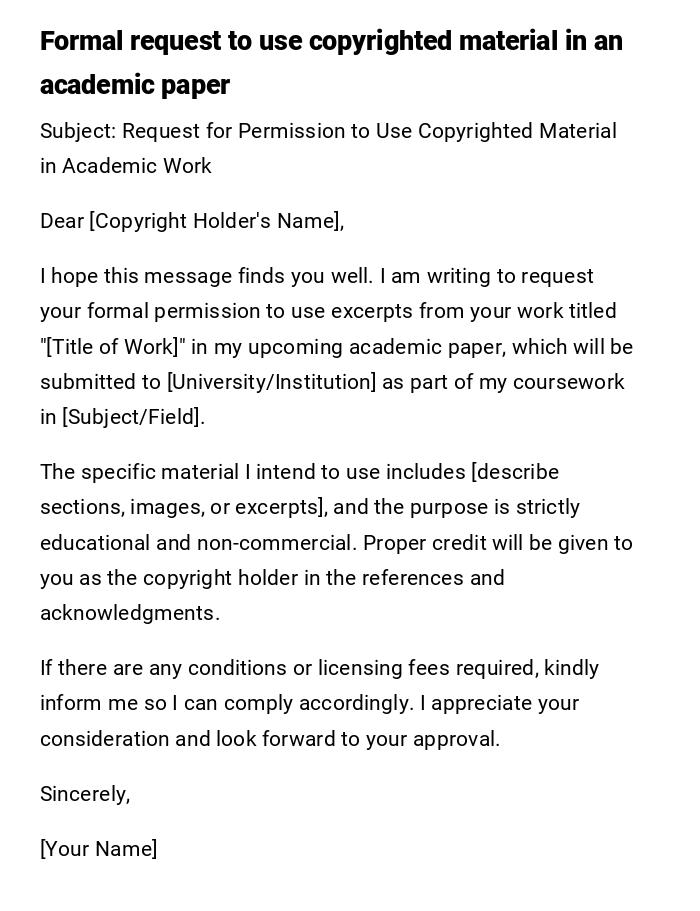
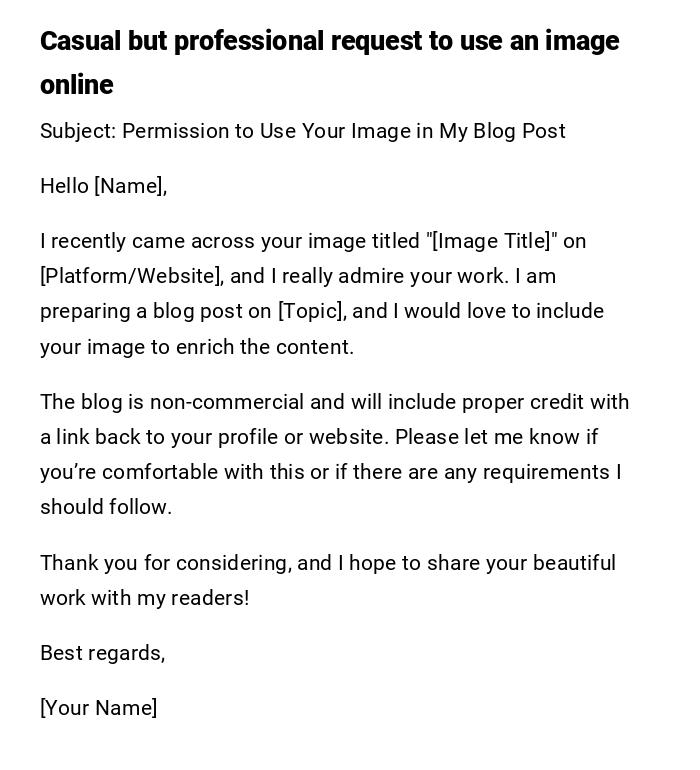
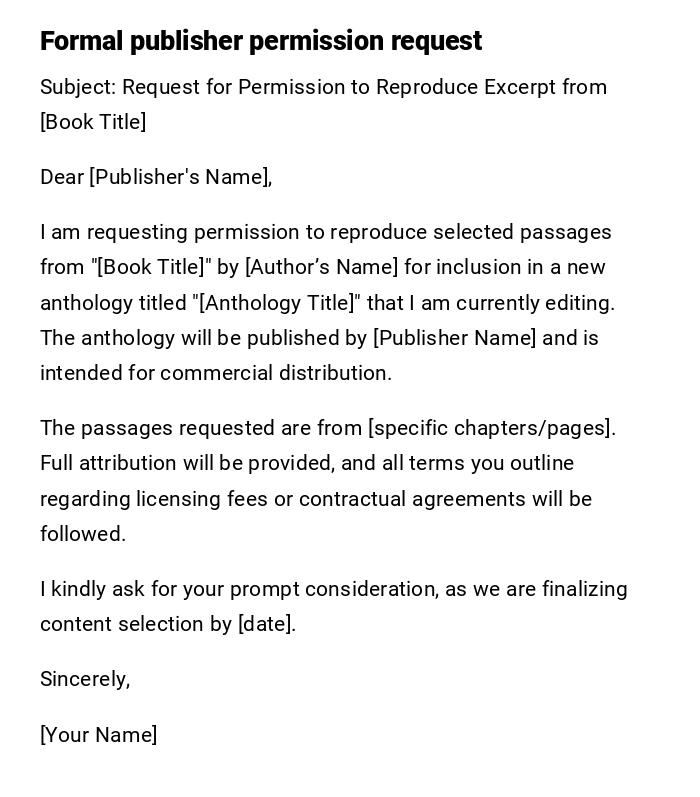
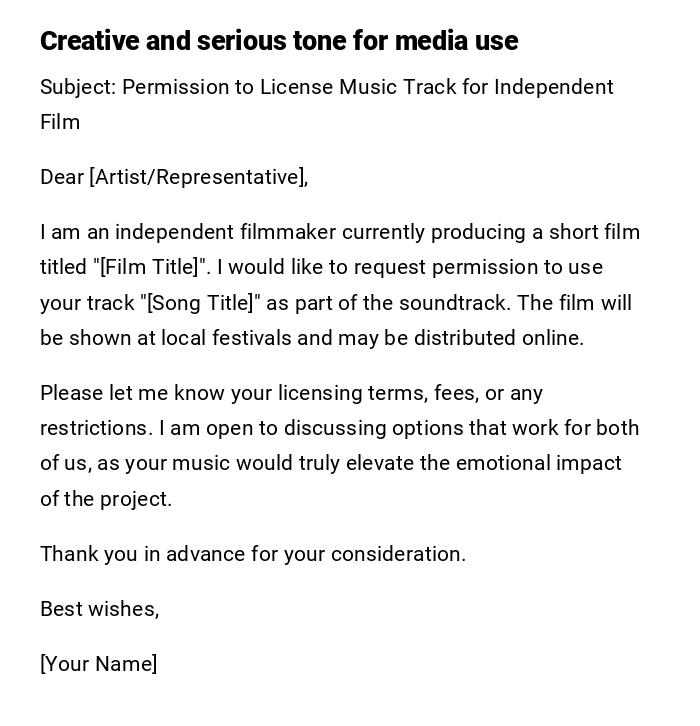
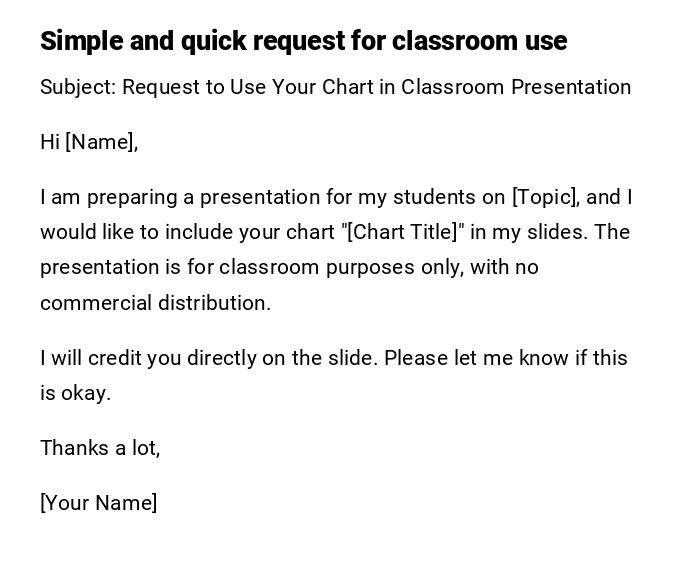
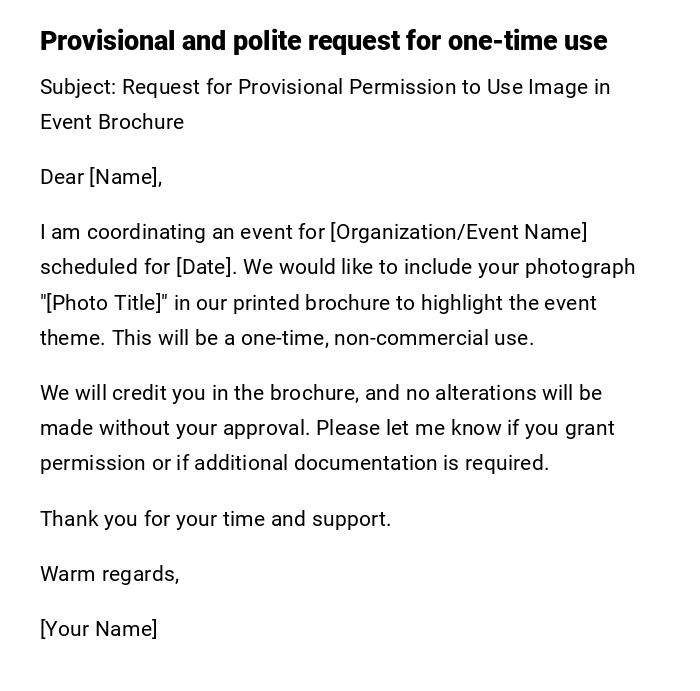
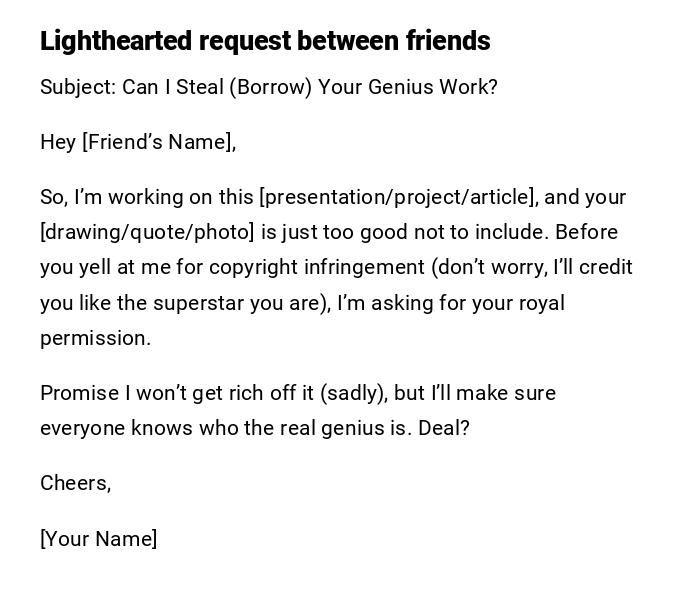
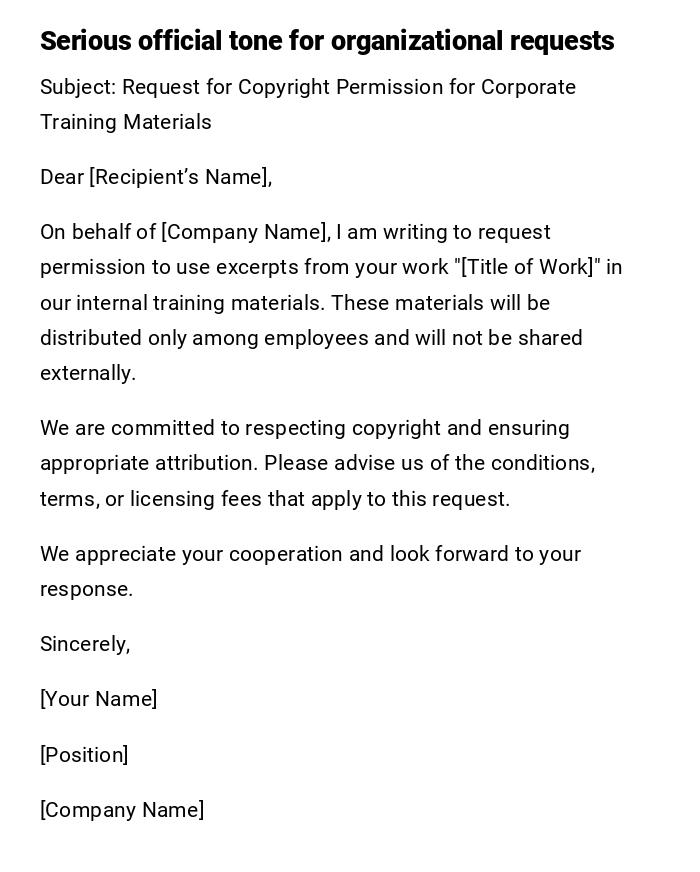
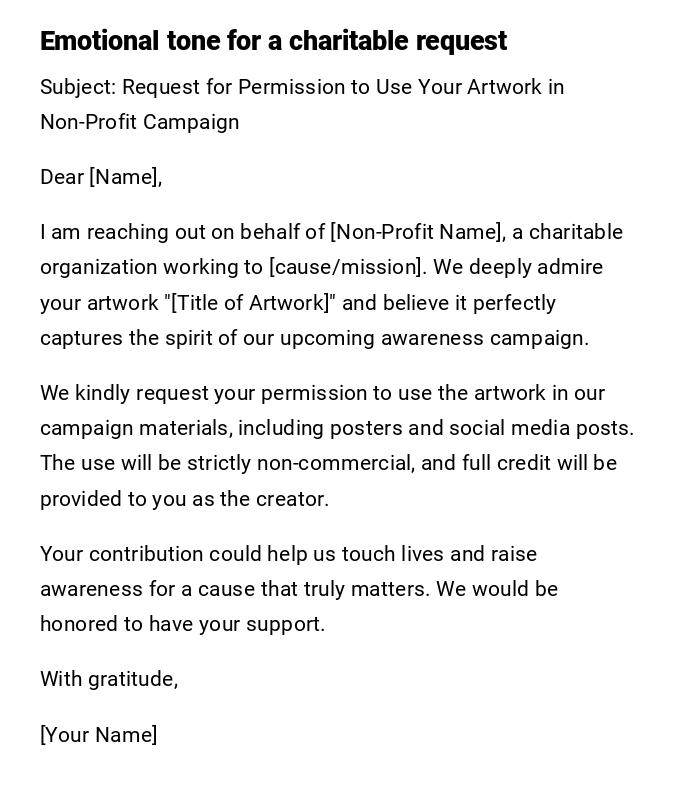

 Download Word Doc
Download Word Doc
 Download PDF
Download PDF